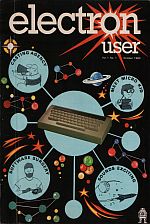Introduction
There can be few Electron owners who have not acquired at least some knowledge of their computer from the pages of Database Publications' Electron User magazine.
In this series of occasional articles, I plan to supply an index for, and chart the course of Electron User from humble beginnings to its demise in July 1990.
The very first issue of Electron User (EU) appeared as a pull-out supplement in the October 1983 edition of The Micro User, Database's then well-established monthly magazine devoted to the BBC computer. In fact, the first four issues of EU rode piggy-back in this way and they will all be coming under the magnifying glass here. The programs that were on them were eventually bundled together on a special EU tape too.
|
Electron User 1. 2, November 1983
That Database video ad was on the inside front cover again.
NEWS: We were assured that there was an 'Electron Boom'. Software/Hardware producers were working around the clock to deliver amazing new goodies (?!). Production lines in Malaysia and Gwent (Who can tell the difference?) were having difficulty turning out the 200,000 Electron computers that Acorn had ordered. The Micro Kid still wasn't funny.
The Casting Agency featured a 'Cup and Saucer', no doubt intended to complement the 'Teapot' in the previous issue...
Acornsoft had a double-page ad' for twelve of its titles, including the Lisp and Forth programming languages. Does anyone still use them?
Nigel Peters looked at both sides of the 'Spectrum versus Electron' debate that seemed to have been examined by most of the popular computer mags at that time, and came to the conclusion that the Speccy was good but that the Elk was better. I wonder if Nigel ever presented the same debate with the opposite outcome in Sinclair User...
Sounds Exciting offered six more roucous cacophonies, including 'Electric Spark' and 'Crash'.
Micro Power had a two pager for ten of their games, average price £7.95 each. It's interesting to note that in 1990 Software Bargains were selling the same titles for less than £1 each...
Listings in this issue consisted of three short firework simulations and 'COUNTING', an educational program for tinies.
Electron User 1. 3, December 1983
Inside front cover? Database video!
NEWS: Acorn admitted it was having problems producing enough Elks due to "Unexpected demand".
The Casting Agency had a festive theme with a snowman, holly leaves etc. Personally, I think a milk jug would have been nice, to go with the cup, saucer and teapot...
The listings were Anagrams, Meteors, French Tutor and in particular Hangman which was the first program to appear with an article explaining its structure.
Book Reviews:
Start Programming with the Electron was not very well recieved;
The Electron Book: BASIC Sound and Graphics could do no wrong; and
Assembly Language Programming on the Electron was a 'nice' book, so they said.
Software Surgery reviews:
Swoop (Program Power) - 'It's a great game'.
Tree Of Knowledge (Acornsoft) - 'Worth considering'.
The Ghosts Of Grunley Grammar (Magic) - 'Amusing and addictive'.
Sounds Exciting, rather than simply listing SOUND and ENVELOPE parameters, this time discussed the basics of how they work.
Electron User 1. 4, January 1984
Whereas the first three issues had a mere 16 pages this one was boosted to 32. Inside front cover ? Well, well, well, Database video!
NEWS: The main story was that Electron User would be going solo next issue.
Acorn still couldn't produce enough Elks. "The Electron is almost embarrassingly successful", said a WHSmith's spokesperson, commenting on the fact that punters were actually camping outside their shops to be first in line for the next delivery.
Paul Kathro, technical advisor to the then thriving (now long-gone) hardware supplier 'Sir Computers', announced the launch of a sideways ROM board which, the Elk's lack of mode 7 not withstanding, would allow BBC ROMs to be used.
Software Surgery took a peep at:
Cylon Attack (A & F Software) - 'Thoroughly recommened'.
Horoscopes (Third Program) - 'Limited for home use'.
Felix In The Factory (Micro Power) - 'A good version of an old idea'.
Book Review:
The Electron Programmer (S. M. Gee & Mike James). The verdict on this was 'well worth considering'.
Casting Agency characters were meant to have a Noah's Ark flavour, but did the fabled biblical boat-builder really take an 'Alien' and a 'Monster' on board..? Sadly, there were no further additions to the tea set.
Among the Sounds Exciting effects were two which would have been invaluable in any fast-moving, space-age shoot 'em up: 'Alarm Clock' and 'Road Works'...?!?!?!
Listings (Which took up most of the mag!):
KALEIDOSCOPE - Simulation of the classic optical device.
COMBINATIONS - Simple variation of the 'Mastermind' peg game.
ORBIT - Simulation of sub-atomic particles orbiting a nucleus.
SIMON - Simulation of the sequential recollection game/toy.
H/P INTEREST - Interest rate calculator.
DICE - Cheat-proof dice-rolling utility.
QUACKERS - Animated duck demo.
DOODLE BUG - Drawing and pattern-making utility.
BUZZ WORD - Meaningless phrase generator (I can do that unaided!).
SQUARES - Create designs using different sized & coloured squares.
IRON RING - Short prog to draw a 3D representation of a solid ring.
EUROMAP - Geographical quiz using on-screen maps.
That's it for now, next time we'll be rolling back the years to February 1984 to see how EU made out in the playground without Big Brother for protection!
Will Watts, EUG #11






